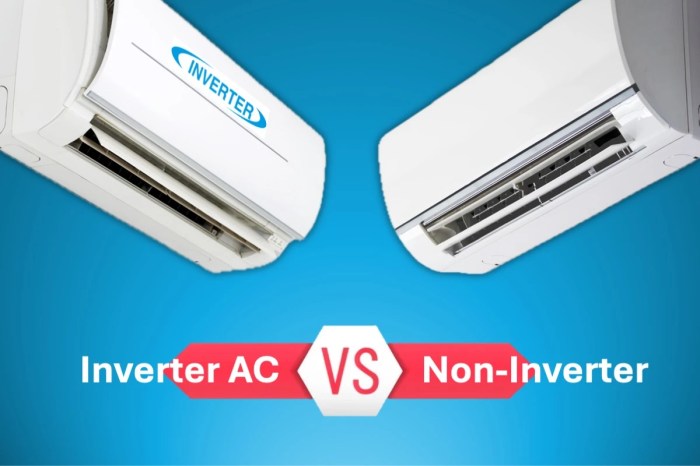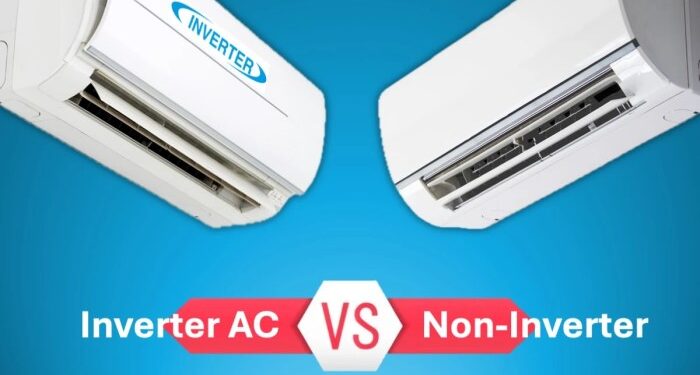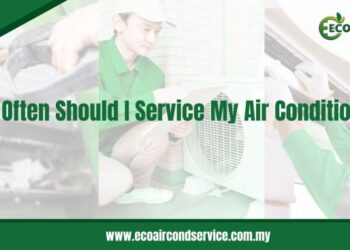Delving into the comparison of inverter versus non-inverter air conditioners, this piece invites readers into a realm of insightful analysis, offering a comprehensive look at the key factors that determine the superiority of one over the other.
The subsequent section will delve into the intricate details of how each type operates and the impact on energy efficiency, cooling performance, cost, noise levels, durability, and maintenance.
Inverter vs. non-inverter AC
Inverter air conditioners are known for their energy efficiency compared to non-inverter models. This is mainly due to the way inverter technology works in regulating the compressor speed based on the cooling demand.
Energy Efficiency
Inverter air conditioners use a variable speed compressor that adjusts the cooling output according to the room temperature. This means that the compressor runs at a lower speed when the desired temperature is reached, reducing energy consumption. On the other hand, non-inverter ACs have a fixed speed compressor that turns on and off to maintain the set temperature, resulting in frequent energy spikes.
- Inverter ACs offer better energy efficiency as they consume less power by running at lower speeds when needed, leading to lower electricity bills.
- Non-inverter ACs consume more energy due to the constant start-stop cycles of the compressor, resulting in higher energy consumption and costs in the long run.
- According to Energy Star, inverter air conditioners can save up to 30% more energy compared to non-inverter models, making them more environmentally friendly.
Cooling Performance
Inverter air conditioners are known for their ability to regulate compressor speed, providing consistent cooling throughout the day. The compressor in an inverter AC adjusts its speed based on the temperature requirements, ensuring that the room stays at the set temperature without frequent starts and stops.
Regulation of Compressor Speed in Inverter ACs
- Inverter ACs use a variable speed compressor that can adjust its speed based on the cooling needs of the room.
- By running at lower speeds when the cooling demand is low and increasing speed when needed, inverter ACs maintain a consistent temperature more efficiently.
- This results in better energy efficiency and reduced electricity consumption compared to non-inverter ACs.
Impact of Fixed Speed Operation in Non-Inverter ACs
- Non-inverter ACs operate at fixed speeds, turning on and off to maintain the desired temperature.
- Due to this on-off cycle, non-inverter ACs may experience temperature fluctuations, leading to less consistent cooling.
- The frequent starts and stops also result in higher energy consumption and increased wear and tear on the compressor.
Cost Comparison
Inverter air conditioners and non-inverter air conditioners differ not only in terms of cooling performance but also in their costs. Let's take a closer look at the initial costs and long-term savings associated with each type of air conditioner.
Initial Costs
When comparing initial costs, non-inverter air conditioners are generally more affordable than inverter models. Non-inverter AC units are typically cheaper to purchase upfront, making them a more budget-friendly option for those looking to save on initial expenses. On the other hand, inverter air conditioners tend to be a bit pricier due to their advanced technology and energy-efficient features.
While the initial cost may be higher, it's essential to consider the long-term savings that come with inverter AC units.
Long-Term Savings
In the long run, inverter air conditioners can lead to significant savings on electricity bills compared to non-inverter models. The energy-efficient operation of inverter AC units allows them to adjust the compressor speed according to the cooling needs, resulting in lower energy consumption and reduced electricity costs over time.
On the contrary, non-inverter air conditioners operate at a fixed speed, leading to higher energy consumption and ultimately higher electricity bills. Despite the higher initial cost, the long-term savings provided by inverter air conditioners make them a cost-effective choice for those prioritizing energy efficiency and lower utility expenses.
Noise Levels

When it comes to the noise levels of air conditioners, it is an important factor to consider for a comfortable indoor environment. Let's compare the noise levels of inverter and non-inverter ACs during operation.Inverter technology plays a significant role in reducing the noise produced by air conditioners.
Inverter ACs are designed to operate at varying speeds, adjusting the compressor's speed to meet the cooling requirements. This results in a more efficient and quieter operation compared to non-inverter ACs, which operate at a fixed speed and can produce more noise.
Noise Levels Comparison
- Inverter ACs typically produce noise levels ranging from 20 to 50 decibels, depending on the model and capacity.
- Non-inverter ACs, on the other hand, can produce noise levels between 40 to 60 decibels during operation.
Durability and Maintenance
When it comes to the durability and maintenance of air conditioners, both inverter and non-inverter units have their own set of requirements and expectations.
Maintenance Requirements
- Inverter Air Conditioners: These units typically require less maintenance compared to non-inverter models. Regular cleaning of the filters and coils is essential to ensure optimal performance. Additionally, it is important to check and clean the outdoor unit to prevent any debris buildup that could affect the efficiency of the system.
- Non-Inverter Air Conditioners: Non-inverter AC units tend to require more frequent maintenance. The filters need to be cleaned or replaced regularly to maintain good air quality and airflow. The coils may also need cleaning to prevent dust and dirt buildup.
Expected Lifespan and Durability
- Inverter Air Conditioners: Inverter units are known for their energy efficiency and longer lifespan. With proper maintenance, an inverter AC can last anywhere from 15 to 20 years, making it a durable choice for long-term use.
- Non-Inverter Air Conditioners: Non-inverter AC units have a relatively shorter lifespan compared to inverters, typically ranging from 10 to 15 years. The compressor in non-inverter models may experience more wear and tear over time, leading to a shorter overall lifespan.
Closure
As we conclude our exploration of inverter versus non-inverter air conditioners, it becomes evident that each has its own set of advantages and drawbacks. Ultimately, the choice between the two hinges on personal preferences, budget constraints, and specific requirements.
Answers to Common Questions
Are inverter air conditioners more energy-efficient than non-inverter models?
Yes, inverter air conditioners tend to be more energy-efficient due to their ability to adjust compressor speed based on cooling needs, unlike non-inverter ACs that operate at fixed speeds.
Do inverter air conditioners cost more upfront?
Generally, inverter air conditioners have a higher initial cost compared to non-inverter models. However, the long-term savings on electricity bills can offset this initial investment.
Which type of air conditioner is quieter during operation?
Inverter air conditioners are typically quieter than non-inverter models due to the technology that helps regulate noise levels.
What is the expected lifespan of inverter versus non-inverter air conditioners?
Inverter air conditioners are known to have a longer lifespan and better durability compared to non-inverter models, provided they are properly maintained.















